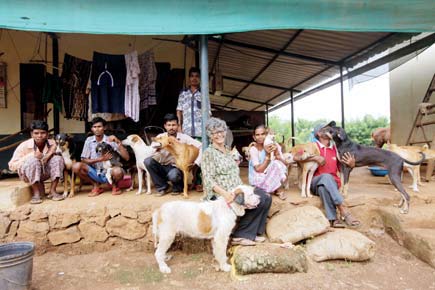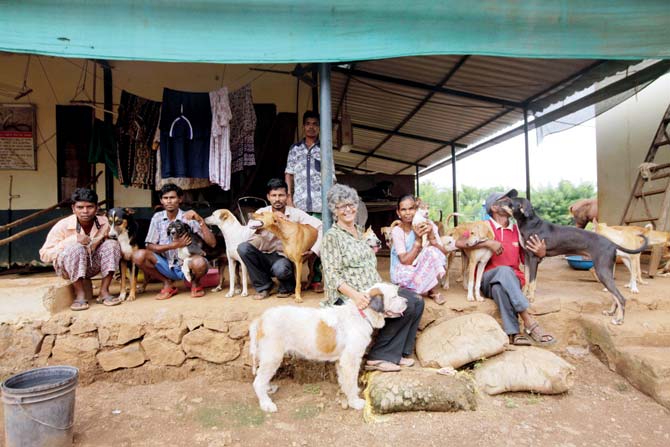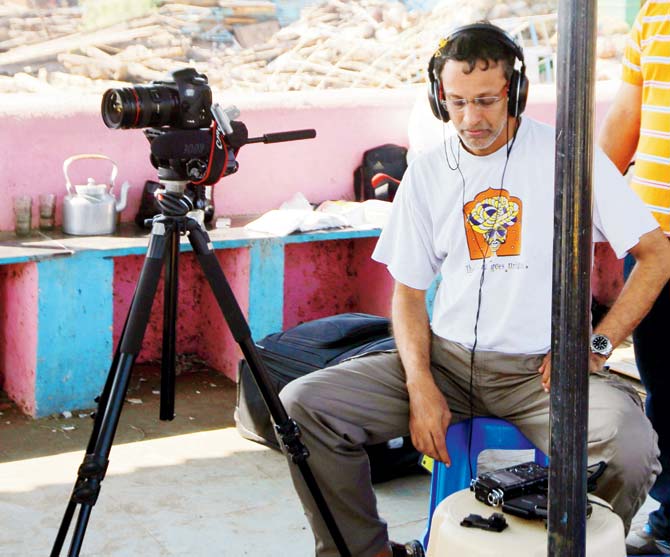A little-known animal hospice in Karjat gets its spot in the sun, thanks to Ravi Iyer's documentary

A still from the documentary shows Roxanne Davur of Probably Paradise with her animals and residents from the nearby Takwe village
ADVERTISEMENT
Six months ago, when filmmaker Ravi Iyer called up Roxanne Davur to say he wanted to make a short film on her Karjat animal shelter, the brusque response he got was, 'First you make it to this place.'

A still from the documentary shows Roxanne Davur of Probably Paradise with her animals and residents from the nearby Takwe village
"At that time, I found it quite strange," recalls Iyer. However, he did make it there days later. "At the gate, we were greeted by a pack of 70 dogs, who came charging towards me in excitement. It was only natural, because they don't get visitors often. Many people call up offering to volunteer, but never turn up," says the filmmaker, whose documentary on this shelter titled Probably Paradise, on Friday won a recent award at the YES! I am the CHANGE, a social initiative that recognises impactful films on social causes.

Shivaji Park resident Ravi Iyer shot the film in half a day
Located on a 1.5-acre plot in Karjat, 68 km from Mumbai, Probably Paradise is Maharashtra's little-known animal hospice run almost single-handedly by 63-year-old Davur. All the 110 inmates — dogs, cats, horses, donkeys and pigs — have had a traumatic past. While many have been abandoned, some have been maimed in accidents and others rescued from abusive environments. Almost all are afflicted with chronic disability either since birth or due to an accident. Veeru, for instance, is a lame chestnut-brown pony who was abandoned in Vasai. There's also Meggie, the Great Dane, who was abandoned in Thane by a breeder because of a chronic skin problem that causes odour. While many have been rescued by Davur, some were brought here by pet owners unable to manage them. Still others have been brought in by concerned animal lovers.
"I started the hospice in the Christmas of 2012 and called it Probably Paradise because just 'paradise' is a boring place. By that time I didn't require anybody's permission. By this I mean, family approval to keep the animals," says Davur, who is helped by four locals from nearby Takwe vilage who come in the day to help.
Living away from the city hasn't been a lonely exercise. "It's so much fun. Animals don't feel sorry for themselves. Many people ask me why I choose to live with older, ailing animals, and I ask them, will your husband or wife remain young forever?" says Davur, who used to work at the Mahalaxmi Racecourse, helping with the maintenance of horses.
"Many people donate money for the cause, but don't really know how much goes into taking care of these animals. She wakes up at 4 am every day to prepare food and medicines. She also has a vet who helps out, but at a cost, of course," says Iyer, who owns a production house in the city that specialises in animated films and TVCs.
Every month, Davur has to spend about Rs 3,000 on medication and treatment for each animal. That's more than R2 lakh a month. "Financing this project is the biggest problem. I do have regular donors and good Samaritans who help, but I'm always forced to beg for funds because it's never enough," says Davur, calling the hospice, 'a bathtub with a plug'.
"Although she has trained the villagers, she does most of the work herself. From preparing food to treating wounds," says Iyer, a Shivaji Park resident, whose three-minute short film was shot in half a day.
He recalls an incident that validated Davur's reputation in the village as a feisty lady who fights injustice. "While we were shooting, we happened to see a man on a bike carrying a large number of chickens. Some were even on the silencer. Davur
yelled at the man, stopped him and took him to the police chowkie. I've never met anyone like her."
 Subscribe today by clicking the link and stay updated with the latest news!" Click here!
Subscribe today by clicking the link and stay updated with the latest news!" Click here!







